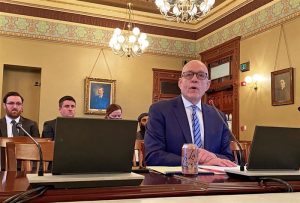First openly LGBTQ legislative leader reflects on his service
By Grace Kinnicutt Capitol News Illinois — May 21, 2022
House Majority Leader Greg Harris introduces a budget bill in April 2022 during his last term in the General Assembly. (Capitol News Illinois photo by Jerry Nowicki)
SPRINGFIELD – House Majority Leader Greg Harris, the number two Democrat in the Illinois House of Representatives, never imagined landing the role of state representative – or that he would leave office feeling that he has been successful at it.
The first openly LGTBQ leader in Illinois History, Harris, 66, of Chicago, has served eight terms in the Illinois House. He currently represents the 13th District encompassing parts of Uptown, Ravenswood, Lincoln Square, North Center, West Ridge and Bowmanville.
“It was an honor of a lifetime to get elected and serve,” Harris said. “Even more to be able to serve in a leadership role and help the state get through multiple challenges.”
In November 2021, Harris, who has become a lead Democratic voice on budget issues and countless others, announced he would not seek reelection after completing his term.
Harris said he was stepping down because he achieved most of his priorities over the years and, during the COVID-19 pandemic, discussion grew about the need to change the system and let new, younger voices take control.
“It just seemed like a logical time to leave and let a whole new generation of leaders take charge in the House,” Harris said.
A Colorado native, Harris moved to Chicago in 1977 with a journalism degree from the University of Colorado at Boulder that he would instead use in marketing and governmental relations at the National Home Furnishings Association.
The association eventually left Chicago in 1988, but Harris stayed and helped organize a program that delivered home-cooked meals to AIDS patients. He co-founded that program, Open Hands Chicago, replicating a similar program in San Francisco. It was the city’s first in-home meals program targeted to people living with HIV and AIDS and has become Chicago’s largest food provider with that purpose.
“At the time, we were just groups of people sitting around our kitchen tables, figuring out how do we get food to people or how do we get health care for people,” Harris said.

Tom Tunney, Chicago Alderman of the 44th Ward
Harris, who has lived with HIV for more than three decades, recalled at the time that there were no similar services offered by the federal government. As Harris and the organizers continued to watch people they knew getting sick and dying from the virus, they decided to be proactive with the meal program.
Tom Tunney, Chicago Alderman of the 44th Ward, said he first met Harris when volunteering and offering the kitchen of his Lakeview restaurant to Open Hands Chicago. Tunney took over the Ann Sather restaurant in 1980, helping to produce meals for the organization.
Tunney said Harris has remained a close friend and political advisor to him throughout the years and that Harris has always assisted when needed, including with work on the LQBTQ-focused Center on Halsted.
“Without Greg Harris, whether it’s the Center on Halsted to AIDS funding or the AIDS garden along the lakefront, it wouldn’t have happened without his assistance,” Tunney said. “He is a valued friend and a leader for his and my generation.”
Following his community activism, Harris served as the chief of staff to former 48th Ward Chicago Alderman Mary Ann Smith for 14 years before being elected to the Illinois House in 2006.
Harris was first appointed to appear on the ballot in the November 2006 general election when Chicago Democratic Rep. Larry McKeon, who was, like Harris, openly gay and HIV-positive, announced his intention to retire in July of that year.
McKeon had already been nominated as the Democratic candidate in the March primary. Selecting a replacement nominee was the task of five Democratic ward committeemen in McKeon’s district.
“I watched what (McKeon) was able to do and saw there were so many things that needed to be done for the LGBTQ community and thought, I should take a chance on trying to get this job,” Harris said.
Harris has since been re-elected seven times, never facing a challenger.
One of the most notable bills Harris spearheaded during his time in the General Assembly was a measure legalizing same-sex marriage.
The measure passed the Senate 34-21 on Feb. 14, 2013, and passed the House, 61-54, on Nov. 5, 2013. Then-Gov. Pat Quinn signed it that November and it went into effect June 1, 2014.
But the journey to legalize marriage equality in Illinois was a long-fought battle with opposition on both sides.
Harris first introduced legislation for marriage equality in February 2007, but it died in committee. For the next few years, he would reintroduce legislation in each new General Assembly, but it would fail to move from committee.
But in January 2013 Harris and former State Sen. Heather Steans filed Senate Bill 10 for marriage equality that moved out of the Senate Executive Committee in early February and onto the Senate floor for a full vote.
On the last day of the spring session in May, months after the Senate had already approved the bill, Harris chose not to call it for a final vote on the House Floor.
He recalled that last day of the spring session in 2013, explaining that he made the tough decision because he was anticipating its defeat, and seeing the bill fail would have been a “catastrophic strategic mistake.”
Fundamental rights were at play, he said, and many in the General Assembly were hesitant to support it.
Harris said that representatives were willing to vote yes if they knew for certain that they were going to be on the winning side of history that day.
“If you burn people, they’re not going to come back the second time and vote again,” Harris said.
In the following months, Harris and other advocates for marriage equality lobbied representatives who were on “the cusp of indecision.”
Harris noted the driving force of advocating for marriage equality came down to motivating constituents and their family members, faith leaders and other local elected officials to tell their representative how important the issue is to them.
“We really focused on how do we find people in all those communities to go tell their representatives there are people in this community who this is really important to,” Harris said.
When lawmakers returned to session in November 2013, the measure passed with one vote to spare.
In 2010, Harris was also the lead House sponsor of Senate Bill 1716, which established the Illinois Religious Freedom Protection and Civil Union Act that recognized civil unions of same-sex couples in the state.
Rep. Mark Batinick, R-Plainfield, who is also stepping down after this term, said he wishes there were more individuals like Harris in the General Assembly, because he has always kept an open mind and was willing to work with anybody.
Batinick recalled the first time he met Harris. Batinick was a freshman lawmaker, it was his first day on the House floor and Harris walked over to introduce himself, shook his hand and asked Batinick if he’s one of those policy regulators.
“I laughed and told him I just go where I think the policy takes me,” Batinick said.
The pair worked together on improving mental health funding in the state, a common issue important to both lawmakers.
Harris reflected on his own past experiences and struggles with drugs, alcoholism and mental health, which he said served as a reminder that there are people in need of help, and government officials have an obligation to ensure support services are available.
“I was that guy one time, who was desperate and sort of scrambling for people to help him and I want to be sure that I think about others the same way,” Harris said.
gkinnicutt@capitolnewsillinois.com
Illinois GOP Floor Leader Batinick ready to ‘pass the baton’



